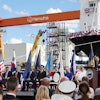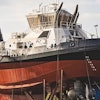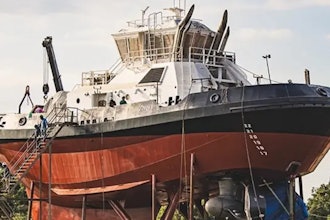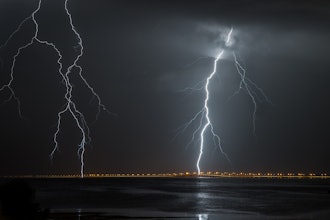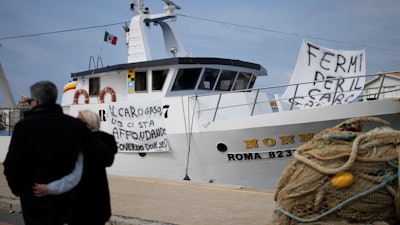
MILAN (AP) — Italian paper mills that make everything from pizza boxes to furniture packaging ground to a halt as Russia's war in Ukraine has sent natural gas prices skyrocketing.
And it's not just paper. Italian steel mills, likewise, turned off electric furnaces last week. And fishermen, facing huge spikes in oil prices, stayed in port, mending nets instead of casting them.
Nowhere more than in Italy, the European Union’s third-largest economy, is dependence on Russian energy taking a higher toll on industry. Some 40% of electricity is generated from natural gas that largely comes from Russia, compared with roughly one-quarter in Germany, another major importer and the continent's largest economy.
Over the past decade, Italy's dependence on Russian natural gas has surged from 27% to 43% — a fact lamented by Premier Mario Draghi. It will take at least two years to replace, his energy transition minister says.
Even before the war, Europe was facing a serious energy crunch that drove up costs for electricity, food, supplies and everything in between for people and businesses. Ever higher prices tied to fears that the conflict will lead to an energy cutoff are hitting the continent much harder than the U.S. because it imports so much of its oil and gas from Russia.
European leaders meeting Friday in Versailles outside Paris discussed ways of easing the pain. Draghi pushed to diversify gas sources, develop renewables and introduce a cap on natural gas prices. He said his foreign minister, who recently visited Algeria and Qatar, was working on new gas markets.
“We are talking about errors made over many years," said Francesco Zago, CEO of the Veneto-based paper and packaging manufacturer Pro-Gest. “We get too much gas from Russia. In school, they tell us we need to diversify the sources, otherwise there is a danger.”
Natural gas prices were on the rise last year as reserves dwindled in Europe, but Zago said his company was able to stabilize prices and continue operating. That changed with the Russian invasion, when already high prices soared from 90 euros a megawatt hour to over 300 euros a megawatt hour.
“We found ourselves facing huge losses,’’ Zago said.
To remain profitable, he said they would have had to nearly double prices from 680 euros a ton to 1,200 euros — not doable on the marketplace.
He suspended operations at six mills that recycle paper to supply one-third of all of Italy’s packaging needs, and he is keeping a close eye on the energy market to see when production can relaunch. For now, there is still enough stock to keep open the company's sites that make cardboard boxes and other packaging, supplying industries from food to pharmaceuticals to furniture. But that could run out soon.
Likewise, Acciaierie Venete shut three of its steel mills for a few days last week as prices spiked to 10 times above normal. The makers of high-quality steel for automotive and agricultural machinery had enough stock to work on finished product, waiting for prices to dip so they could reopen.
“Never, ever has this happened that we had to shut down ovens,’’ said Francesco Semino, an executive at the steel-making company based in the northeastern region of Veneto.
The urgency of Italy’s energy situation is trickling down to consumers in the form of higher heating bills, and more recently, rising prices at the pump, with gasoline topping 2 euros a liter this week, or nearly $6 a gallon.
Radio call-in shows are soliciting ideas about how to save energy, reviving memories of long-abandoned tricks like ember-fueled bedwarmers. Italy’s state broadcaster has launched a campaign with lists of how to save energy, including turning off lights, lowering thermostats and regularly defrosting refrigerators, under the motto “M’illumino di meno,’’ or “I light up less.”
Truckers who say they can't afford higher gasoline prices are set to strike this coming week. Fishermen took the hit last week, deciding not to trawl the waters off Italy, with fishing boats along the entire peninsula moored in port.
At current prices, it costs 1,250 euros a day to run boats out of Fiumicino, leaving little room for profits after plying the sea for cod, sea bass, sea bream, octopus, squid and shrimp, said Pasquale Di Bartolomeo, who runs one of 22 boats out of the port near Rome.
Restaurants, he said, will make do with frozen seafood or farm-raised fish. He hopes the prices ease so he can return to work.
“The family needs to eat, there are expenses,’’ Di Bartolomeo said.
Italy decreased its gas consumption from 2010 to 2014, thanks to the addition of subsidized wind and solar power, but reliance on natural gas pushed back up again in recent years as it took polluting coal power plants offline.
They have been substituted mostly by natural gas as renewables stalled, partly because of Italy’s infamous bureaucracy that has kept many investors away, said Matteo Di Castelnuovo, an energy economist at Milan’s Bocconi University.
“Italy clearly underestimated the problem of increasing its gas consumption the last few years, and with that, its dependence on Russian gas,’’ he said.
The government has pledged to simplify red tape, and this week approved six new wind parks that will produce more than 400 megawatts of energy. Energy transition minister Roberto Cingolani has floated the idea of next-generation nuclear to a reluctant population.
"Nuclear fusion will not save us from Russian gas,'' Di Castelnuovo said, referring to a technology that is still decades away.
Italy's dependence on Russian gas can most quickly and effectively be reduced by simple conservation methods, he said, given the time and investments it takes to transition to other energy sources.
That can include such measures as improving home insulation, using appliances that consume less energy and lowering the thermostat.
“My heat, my thermostat, is actually paying for Putin’s missiles and bombs,” Di Castelnuovo said. “It is good enough for me to lower it by 2 degrees and wear a jumper instead.”

